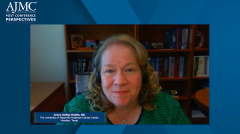
Unmet Needs of Patients with Locally Advanced Metastatic Urothelial Cancer (mUC)
Dr Siefker-Radtke explores unmet needs in the treatment of patients with urothelial cancer and how novel immunotherapies can address some of the challenges with traditional chemotherapy.
Episodes in this series

Arlene Siefker-Radtke, MD: I’m frequently asked about the unmet needs for patients with metastatic urothelial carcinoma. Clearly these are older, frail patients. Patients with bladder cancer are in their mid-to-upper 70s and 80s. We’re treating a geriatric patient population that unfortunately has a lot of comorbid medical conditions. Some of these are associated with smoking. Bladder cancer is a smoking-related tumor. We see a lot of heart disease, a lot of type 2 diabetes, congestive heart failure, and COPD [chronic obstructive pulmonary disease].
Finding options that patients can tolerate, even if they’re older or frail, is important to enhance the outcome of our patients with bladder cancer in general. In fact, it’s estimated that over 50% of our patients with metastatic urothelial cancer aren’t candidates for standard cisplatin-based chemotherapy due to their multiple comorbid medical conditions. It’s truly an unmet need to find therapies that are tolerable that extend a person’s life and can be used in that older, frail patient population.
When talking about novel agents, we often think about mechanisms of action and how we can build that better combination, whether it’s a combination or a sequence of therapies. What makes enfortumab vedotin so attractive is that it’s an antibody-drug conjugate. It brings chemotherapy or a toxin more directly to the tumor cells, and as a result of that, it reduces the toxicity to the rest of the body. When you compare that with systemic chemotherapy, which is given to the whole body without targeting, one can easily imagine the improved toxicity profile using a targeted strategy.
Enfortumab vedotin targets nectin-4 expression, which is found on over 90% of metastatic urothelial cancer cells. Because of that, we don’t need to test for nectin-4 expression. It brings this very toxic monomethyl auristatin E, which is a tubulin drug. It’s much like taxane, but a very potent taxane. It’s so potent that it couldn’t be given systemically due to severe toxicity. It’s only by giving it through a targetable construct, using this antibody-drug conjugate, that it can be administered safely. It’s attached to the antibody via a cleavable linker. That very toxic tubule agent isn’t released from the antibody for activity until it’s internalized into the tumor cell, where it’s cleaved. That’s why it’s so potent against tumor cells and has such an improved toxicity profile compared with other systemic chemotherapy agents.
Through the targeting of this directly to tumor cells, we see less impact on the immune system. In fact, we don’t see a lot of neutropenia or thrombocytopenia, which has typically been observed with systemic chemotherapy agents. By reducing this hematologic toxicity, it also gives us the potential to enhance the immune response.
One concern when chemotherapy has been given with immune checkpoint inhibitors is that the chemotherapy might kill off the immune cells needed to generate the immune response. We certainly see a lot of lymphopenia and neutropenia with gemcitabine-based therapies. But with enfortumab vedotin having such an improved toxicity profile against the myeloid cells and against the immune system, one theory is that this can enhance the response by combining it with an immune checkpoint inhibitor, such as pembrolizumab. That certainly seems to be the case based on early data looking at single-agent cohorts combining enfortumab vedotin with pembrolizumab, which showed the potential for an improved response rate compared with enfortumab vedotin alone. This combination strategy may be a more ideal way of killing tumor cells and releasing antigen without reducing the lymphocytes needed to help generate the immune response when given in combination with an immune checkpoint inhibitor.
Transcript edited for clarity.
Newsletter
Stay ahead of policy, cost, and value—subscribe to AJMC for expert insights at the intersection of clinical care and health economics.










